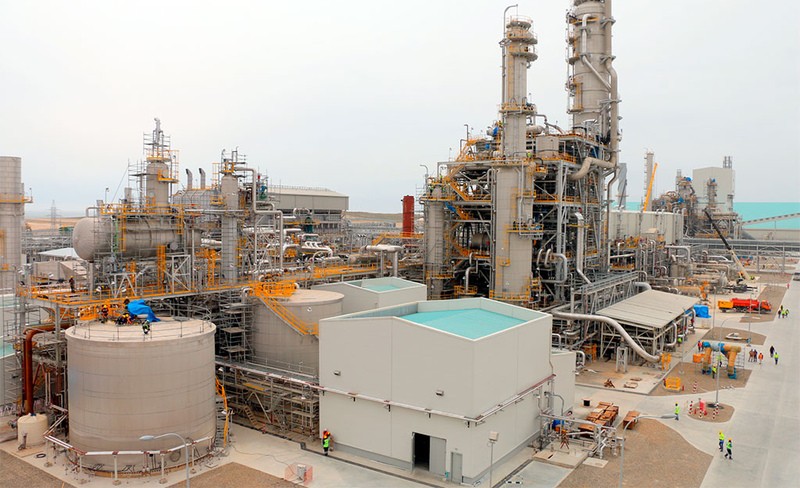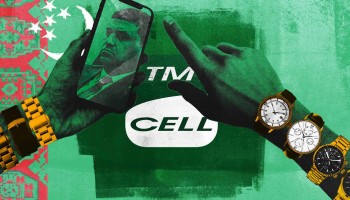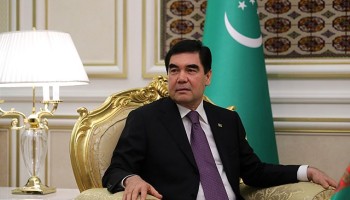In September 2018, the Central Asian nation of Turkmenistan celebrated the opening of a new state-owned chemical factory in the distant city of Garabogaz. Even foreign diplomats in Ashgabat reportedly came out, all the way to the Caspian Sea, to honor the country’s latest industrial achievement.
Built with the help of a $1.16 billion loan from the Japanese Bank for International Cooperation, the factory sharply increased Turkmenistan’s ability to produce urea, a mineral fertilizer that serves as one of the country’s top exports.
A new investigation by OCCRP and its partners, Turkmen.News and Gundogar.org, reveals that one of the main exporters of urea from the plant has been an obscure Scottish company that does not even have a website.
Moreover, though the company’s shareholders and ultimate beneficiaries have changed on multiple occasions, a key figure who played a secretive, controlling role was Hajymyrat Rejepov, the nephew of President Gurbanguly Berdimuhamedov.
This information is based on the Pandora Papers, a leak of millions of documents from providers of offshore corporate services that was obtained by the International Consortium of Investigative Journalists and shared with OCCRP and other media outlets around the world.
Hajymyrat was not the only Rejepov in the data. His younger brother Shamyrat appeared to benefit from a similar scheme, playing an equivalent role in a British-registered company that claims to be a leading exporter of petroleum products — which it buys from the country’s major state oil and gas producers.
The leaked records paint an ambiguous picture of both companies’ ultimate beneficiaries: Their shareholders were offshore “nominees” whose function is to obscure the identity of the real owners. When U.K. law changed to require the disclosure of a company’s “persons of significant control,” several little-known Turkmens were declared at various points. When OCCRP reached out to them, they were either unreachable or declined to comment.
The Rejepovs appear to have done well for themselves. Between them, the two brothers purchased 16 apartments in Dubai, a city-state whose laissez-faire attitude to regulation has made it a hub for money laundering and a playground for the rich and powerful.
The well-connected brothers’ lives are a far cry from the lives of most people in Turkmenistan. Human rights organizations rate the country as among the most authoritarian on earth. President Berdimuhamedov controls most aspects of Turkmenistan’s political life and economy, down to the design of bank cards and medals for show dogs.
Turkmenistan publishes virtually no public records and press freedom is nonexistent, making it particularly difficult for journalists and civil society to uncover what is happening inside the country.
Hajymyrat and Shamyrat Rejepov, as well as the administration of President Berdimuhamedov, did not respond to requests for comment.
Imports and Exports
The new state chemical plant made Turkmenistan the region’s leading exporter of fertilizers: The country exported over 1.16 million tons in 2019 and 2020, according to the UN’s Comtrade database.
There is no publically available trade data that would definitively show how large a role the obscure Scottish company, Caran Holdings, played in these exports. But a variety of sources suggest that it grabbed a major piece of the pie.
In a 2018 interview with the state newspaper Turkmenistan, a man who described himself as Caran’s representative at the new plant said that the company had signed an agreement to export 1.2 million tons of urea produced there through Georgian and Russian ports.
If this amount is really being shipped, the implication is that the company accounts for all of Turkmenistan’s fertilizer exports. (However, the Comtrade data may be incomplete.)
Several independent sources also suggest that Caran is a major player on the market.
Argus Media, an energy and commodity price information agency that uses official government data, describes Caran as “the largest provider of river consignments of Turkmen urea in the current year” in a 2020 report.
Reporters also obtained records attesting to some of Caran’s sales. In 2020, the company sold 213,000 tons of urea to a Russian trading company that passed it to buyers in the United States.
A source in the industry also confirmed that the company regularly sells tens of thousands of tons of the product abroad. He cannot be identified because he spoke on condition of anonymity to share sensitive information, but he corroborated his account by providing reporters with dozens of invoices.
A Presidential Decree
Scottish Secrets
Rejepov, the president’s nephew, is the only high-profile person who appears in Caran’s company documents. He was openly registered as its owner between January and November 2020.
This is difficult to explain if the intent was to disguise his involvement, and possibly represents an error. For the remainder of the company’s existence, reporters found, every trick in the book appears to have been used to avoid exposing him.
Other than this nine-month period, the company’s formal owners were always lawyers or offshore nominee firms, a typical way of disguising who is really behind a company.
And even when U.K. law changed in 2017 to require companies like Caran to disclose their “persons of significant control” — a designation meant to reveal who stands to benefit from their activity, regardless of the owners on paper — Rejepov was never listed.
But there is additional evidence that he played a significant role in Caran. In the first place, two sources who had dealings with Rejepov but cannot be named for their protection said that he controlled the company.
Further confirmation of his involvement comes from the Pandora Papers. Rejepov’s name appears in two ‘power of attorney’ documents, from two different years, that appeared in the leak — one unsigned, the second finalized and notarized. The unsigned document is dated December 2018, just months after the urea plant opened.
Reporters also found that the two other people who appear in Caran’s paperwork as “persons of significant control” appear to be Rejepov’s employees.
One of them is a man named Kerimberdi Yalkabov, who was granted “power of attorney” along with Rejepov. Reporters found Yalkabov’s phone number and ran it through GetContact, an application that shows how numbers are labeled in other people’s contact lists. Yalkabov was repeatedly tagged as an “employee” or “assistant” of “Hajy,” a nickname for Hajymyrat, and as a representative of Caran Holdings.
The other, a woman named Gulnar Charyyarova, was listed in a shipping document as Rejepov’s chief accountant in a company called Ak Hazyna. This Turkmenistani firm, the documents show, was Caran’s key local broker, purchasing urea from the state plant before it was passed on to Caran for export. (Turkmenistani business records are not open to the public, but documents obtained by reporters list Rejepov as this company’s director.)
Finally, since 2020, Rejepov has been listed as the director, and since 2019 as the sole shareholder, of Caran Holdings Limited, an identically named company registered in Hong Kong, according to registry documents there. Reporters were unable to determine whether the Hong Kong company had actively engaged in any business.
The ‘Hong Kong’ Caran
The story of this duplicate Caran offers additional evidence of Rejepov’s involvement with the company’s original Scottish incarnation.
Oil and Gas
While Caran imported and exported fertilizer, Hajymyrat’s younger brother Shamyrat was involved with Delanore, an exporter of petroleum and chemical products from state oil and gas plants in Turkmenistan.
Though it claims on its website to be the leading unit in the export/import of petroleum products in the Middle East and the CIS countries,” the company was built in utmost secrecy.
Its original founder when it was created in the United Kingdom in 2015 was a citizen of the Seychelles, and its subsequent owners were also nominees.
Shamyrat Rejepov’s name has never appeared in any public documents in connection with the company. Similarly to Caran, for years Delanore declared a series of beneficial owners who were low-profile Turkmen citizens.
But among the Pandora Papers was also a signed and stamped power of attorney the company granted to Shamyrat Rejepov in February 2020, similar to the one his brother received for Caran.
It is unclear why Rejepov was granted this authority or what he did with it. He held it for only eight months. But at the end of that period, Delanore appears to have entered a new phase: It was transferred to a Turkish woman named Asiye Ceren Çap, who also became its director and was declared its beneficial owner.
Her involvement signaled a new expansion: A new Turkish company that used the name Delanore, also owned by Çap, was created that year. A new website appeared for a “Delanore Group” where it describes itself as a trader of food, petroleum, and other products. It also refers to affiliated “Delanores” in the United Arab Emirates, Turkmenistan, and the United Kingdom.
Çap herself is not a prominent figure in business, but she married into the family of Muhammet Çap, a Turkish businessman whose construction company undertook state contracts in Turkmenistan during the 2000s.
A Difficult Business
It’s not clear whether Shamyrat Rejepov is involved in this new, larger structure, and neither he nor Asiye Ceren Çap spoke to reporters. Another woman who had been listed as the British Delanore’s shareholder, as well as her son, who was listed as a “person of significant control,” did not speak with reporters. Neither the U.K. or the Dubai offices of Delanore could be reached.
However, the company’s extensive operations in Turkmenistan — its site boasts that it imports and exports numerous products from the country — suggest that it has a powerful and well-connected person in its corner in Ashgabat.
Several clues point back to Shamyrat Rejepov.
When reporters called the number listed for Delanore’s Ashgabat office, the person who answered spoke on behalf of a different company called Ak Rovach, but said it represented Delanore in Turkmenistan. In order to make a purchase of chemicals, the person said, the proper contact would be the company’s “boss,” a man named Dovran Nyyazov.
The leaked Pandora Papers documents show that Nyyazov had a power of attorney over the U.K.-registered Delanore over roughly the same period as Rejepov. Moreover, when reporters entered his phone number in GetContact, among Nyyazov’s entries were several that pointed to his work with Delanore, Shamyrat Rejepov, and the oil business.
Nyyazov declined to speak with reporters.
Despite the Çaps’ difficult business history in Turkmenistan, Rejepov is also known to socialize with a member of the family: His Instagram account shows him relaxing on a private yacht in Turkey with Ukkaşe Çap, one of the sons of the head of the family, Muhammet Çap.
The Nephews in Dubai
It is unclear how much money Hajymyrat and Shamyrat Rejepov have made in commodities trading. However, there are clear signs of their wealth in the United Arab Emirates.
According to leaked real estate ownership data from Dubai provided to OCCRP by the research organization C4ADS, Hajymyrat Rejepov owns nine apartments in five buildings in the city: Sparkle Tower 2, Damac Heights, Sadaf 4, TFG Marina, which hosts a Wyndham Hotel, and the Matrix Tower. Shamyrat owns seven apartments in Sparkle Tower 2, Damac Heights, and TFG Marina.
Except for the Matrix Tower, all the buildings are located in the Dubai Marina, an upscale neighborhood close to the emirate’s iconic man-made archipelago, Palm Jumeirah.
The data does not include the dates of purchase, but based on when the apartments appeared in the database, and the dates the towers were built, they were likely purchased sometime after 2018, the rough period when Caran and Delanore appear to have become most active.
By comparing the Rejepovs’ apartments to similar ones currently for sale in the same buildings, OCCRP and partners estimated that the brothers’ 16 properties are worth approximately $5.5 million.
Kelly Bloss (OCCRP) contributed reporting.

.jpg/daf5f209c20846c8dcd2295cae2a00ae/kenyan-aladdin-sep24-(1).jpg)






